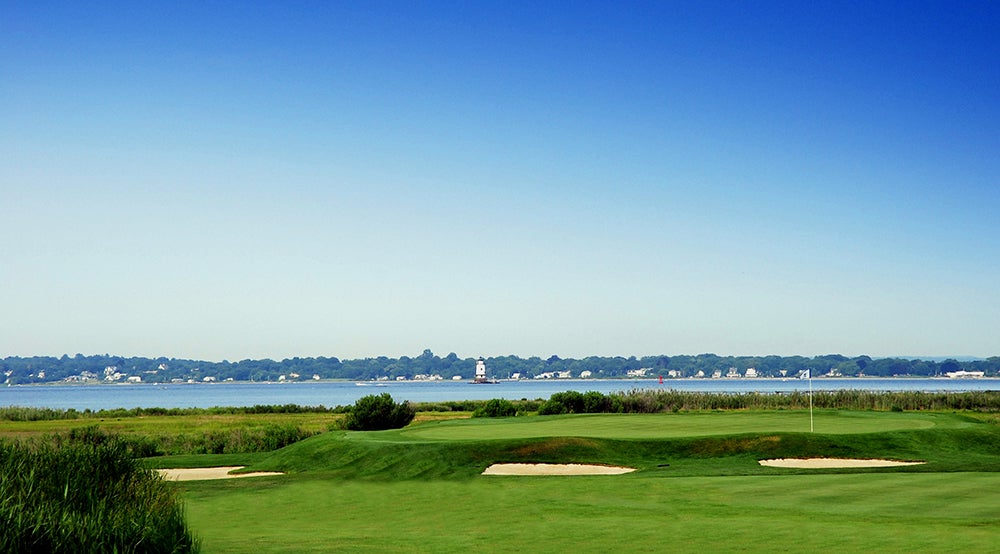For every great course that made GOLF’s 2020-21 ranking of the Top 100 Courses in the U.S., dozens of more must-plays were left on the outside looking in — including at least a handful in your home state. Some of these designs just missed out on a Top 100 nomination, others finished deeper down the ranking, but all are worthy of your time. To shed light on the best courses in every state, we broke out the full results of our Top 100 Courses polling into state-by-state lists. Here’s a closer look at Rhode Island.
Rhode Island golf by the numbers:
Number of courses and U.S. rank: 56 (48)*
Number of golfers per capita rank: 36*
Average public-course greens fees: $$ out of $$$*
Average daily temp and rank: 50.1 (27)
Annual precipitation and rank: 47.9 in. (13)
*Source: National Golf Foundation
Best Rhode Island golf courses (2020/2021)
1. Newport (Newport) [1]
One of the five founding clubs of what is today known as the United States Golf Association, this course is far more than just a museum piece. Under the hand for many years of Ron Forse, this course only improved since Tiger Woods’ historic win over Buddy Marucci for the 1995 U.S. Amateur. The shapes and sizes of its bunkers are among the sport’s most diverse and serve as a timely reminder to modern architects that variety is a vital component to great architecture.
2. Wannamoisett (Rumford)
3. Shelter Harbor (Charlestown)
4. Misquamicut (Watch Hill)
5. Rhode Island C.C. (Barrington)
SYMBOL GUIDE
1 = GOLF Top 100 Course in the U.S.
2 = GOLF Top 100 Course in the World
3 = GOLF Top 100 Resort
P = Resort/public golf course
Ed. note: Some courses were omitted from our rankings because they did not receive enough votes.
Course spotlight: Rhode Island Country Club (Barrington), ranked 5th in Rhode Island. Donald Ross does it again, creating a course that is fun for all ages of players. This family club has hit its stride in recent years, thanks in part to its uber-talented young greenskeeper who has helped open up the course. Once again, balls are skittering along the turf. The final four holes burst out into the open and play along Narragansett Bay and make for a rousing finish, but the two real showpieces of Ross’s talent are likely the sub-400-yard uphill par-4 3rd to a knob green and the reachable par-5 8th, both of which highlight that great golf is much more than just a yardage on a scorecard. — GOLF Top 100 Course Rater

How we rank America’s best golf courses
For the newly released 2020-21 U.S. list, each panelist was provided a list of 489 courses. Beside that list of courses were 11 “buckets,” or groupings. If our panelists considered a course to be among the top three in the country, they ticked that box. If they believed the course to be among Nos. 4-10 in the U.S., they checked that box, followed by 11-25, 26-50, and so on.
Panelists were also free to write in courses that they felt should have been included on the ballot (we had fewer than a handful of such additions in the U.S. vote).
Points were assigned to each bucket; to arrive at an average score for each course, we divide its aggregate score by the number of votes. From those point tallies, the courses are then ranked accordingly. It is an intentionally simple and straightforward process. Why? Because it invariably produces results that are widely lauded. Like the game itself, there’s no need to unnecessarily overcomplicate things.
For much more on how we rate courses, click or tap here.
Meet our course raters
We empower and hold accountable a group of 97 well-traveled — and well-connected — golfers/aficionados, each capable of expressing their own sense of design excellence at the highest level. The group is seasoned and experienced — we look for raters who know what’s out there, what’s changing and what’s coming down the pike. And from judging posts across four continents, our panelists are positioned to place courses from different regions around the globe into proper context, one of the main reasons GOLF’s Top 100 Courses rankings are the most esteemed in the game.
Other ranking outlets employ thousands of raters. Our less-is-more approach creates a more meaningful and thoughtful list. Think about it: When you plan a golf trip, do you call every golfer you know for their take? No. You contact a handful of people whose opinions you value most.
Meet our full crew of panelists here.










